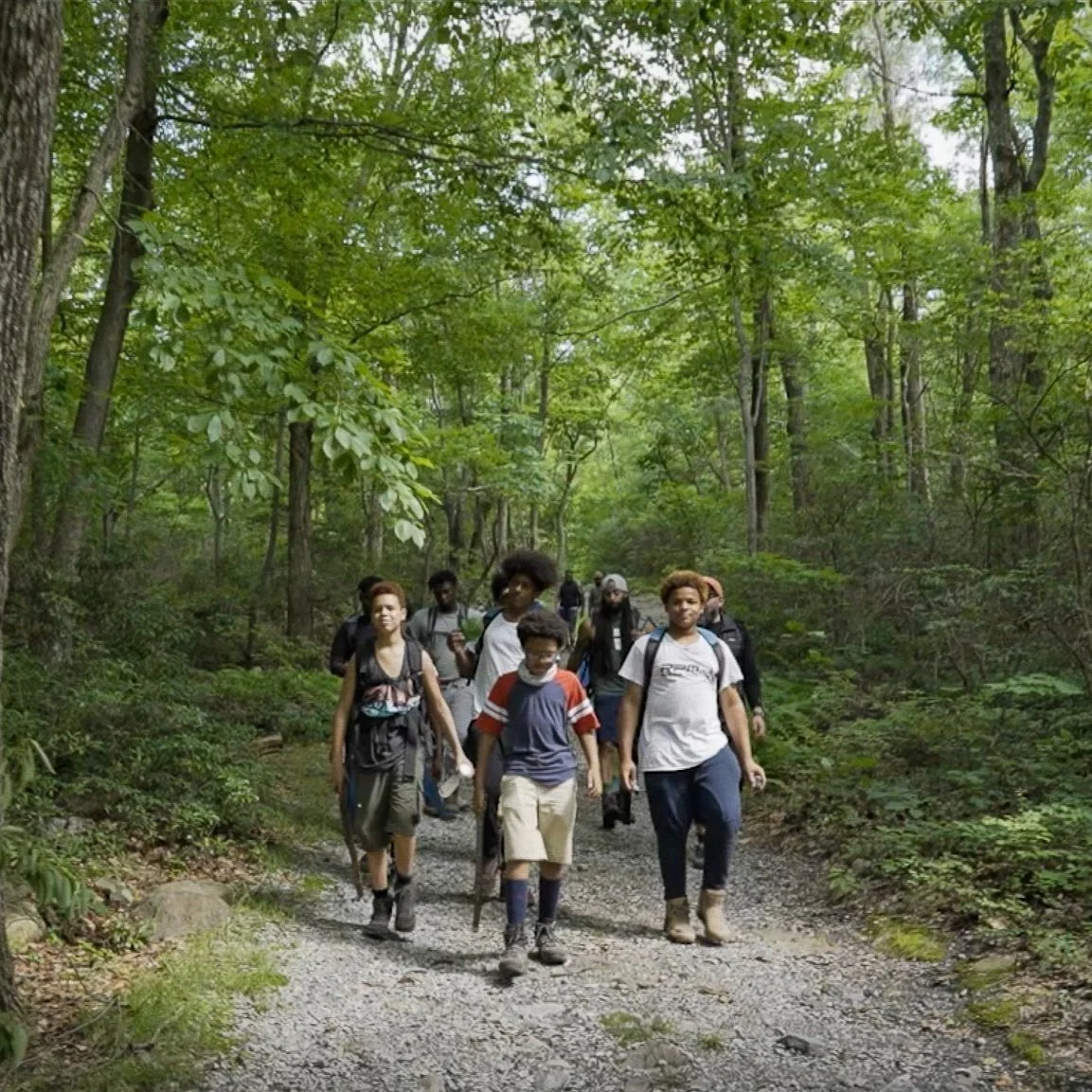Finding Connection and Resilience in Nature for the Anxious Generation
When the van door slides open, it’s often met with hesitation. The young men inside step out cautiously. There’s a moment, brief yet profound, when the silence of the woods settles around them. One of them, usually around 14 or 15 years old, whispers incredulously, “I didn’t know it could be this quiet.” That quiet is the first exhale; a subtle, significant release from the constant tension of urban survival.
Growing up in urban environments often means exposure to chronic stressors such as violence and instability. Over time, young people may develop a sense of ‘comfort in chaos,’ a coping mechanism that helps them navigate their unpredictable surroundings. Yet, this apparent comfort doesn’t erase the underlying trauma; it often masks deeper emotional wounds that require intentional healing; something nature-based programs and specialized therapeutic interventions can meaningfully address.
At Camping to Connect, a nonprofit organization operating in New York City, Denver, and starting Summer 2025 in Newark, NJ, moments of profound transformation through nature are common for the young men we serve. Our mission, though simple, is impactful: to combat loneliness, anxiety, and "nature-deficit disorder," a term coined by Richard Louv, by reconnecting young men with the natural world. Especially those from traditionally underserved communities.
Today’s digitally tethered youth face unprecedented mental health challenges. Excessive screen time and social media dependence have undeniably correlated with rising levels of loneliness, anxiety, and depression. A recent study, the Global Flourishing Study conducted by researchers at Harvard and Baylor University, found that young adults worldwide—particularly in the United States—are struggling more than previous generations. This data, gathered from over 200,000 individuals across 20 countries, paints a stark reality: young people today report lower levels of happiness, physical and mental health, meaningful relationships, and overall life satisfaction compared to their older counterparts.
Jonathan Haidt’s "The Anxious Generation" details the crisis with stark clarity. He describes how modern youth, sheltered by screens and deprived of real-world challenges, lack the resilience that generations before them naturally developed. He points to the Biosphere 2 experiment from the 1990s, where trees raised in ideal conditions collapsed without ever reaching maturity due to a lack of natural stressors. Similarly, young people today, shielded from real-world experiences and conflicts, struggle to develop essential coping mechanisms and social connections. Similarly, Dr. David Blanchflower of Dartmouth College notes that young people’s decline in happiness may largely stem from excessive screen time: "It's not that they're bowling alone; it's that they are not bowling at all."
Time spent outside playing with others offers the necessary “wind” to strengthen young people's metaphorical roots. These outdoor experiences; building campfires, navigating trails, or simply exploring, foster resilience, independence, and self-awareness. They counteract the sedentary, screen-focused lifestyle that many inner-city youth default to, replacing anxiety and isolation with genuine connection and well-being. All senses get activated!
The scientific evidence is compelling: nature significantly reduces cortisol levels, improves mood, enhances cognitive functions, and nurtures social interactions. Young men at Camping to Connect regularly experience these benefits firsthand. Away from the relentless demands of urban life, participants build trust and meaningful relationships. Vulnerability, typically suppressed on city streets, surfaces naturally around campfires beneath open skies. Stories replace silence; leadership replaces anger.
Yet, despite its proven benefits, meaningful access to nature remains tragically limited, particularly for inner-city youth of color. Recent federal policy decisions, resulting in deep cuts to national park services and programs designed to promote inclusive outdoor recreation, exacerbate this inequity. Reduced funding means fewer opportunities for underserved youth to escape urban confines, limiting crucial pathways to emotional and physical well-being.
Carlos Davila, Camping to Connect’s Senior Mentor and Mental Health Lead, emphasizes, “Nature isn’t just a backdrop, it’s a critical teacher. It allows young men to confront their vulnerabilities safely, often for the first time.”
Camping to Connect’s approach and impact have recently been recognized by The Hidden Healing Fund, a pioneering initiative founded by Pinterest and SHOWTIME/MTV Entertainment Studios. As one of the inaugural grant recipients, Camping to Connect is part of a select group of organizations across the U.S. and U.K. that use innovative and community-driven methods to address youth mental health. This initiative, supported by founding partner lululemon and The Starbucks Foundation, highlights the critical importance and effectiveness of holistic mental health solutions rooted in lived experiences and community involvement.
Addressing this crisis requires more than just acknowledging nature's healing power; it demands action. We must advocate for the preservation and expansion of accessible natural spaces and actively support organizations committed to bridging the gap between underserved youth and life-changing outdoor experiences.
If you're moved by the potential to transform loneliness into resilience, anxiety into confidence, and disconnection into belonging, we invite you to join our movement. Donate, volunteer, or simply learn more about our mission at Camping to Connect. Together, we can ensure that nature remains not a luxury, but a fundamental right for every young person.
Let’s provide this anxious generation with the tools, spaces, and opportunities they desperately need. After all, no one builds resilience staring at a screen. Resilience is cultivated by stepping outside, getting a little dirty, and discovering strength within.


